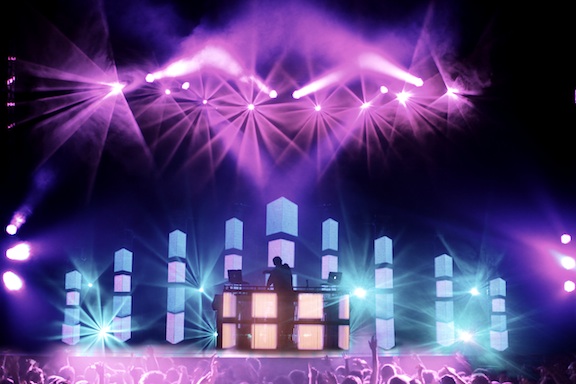If you haven’t been to an electronic show, you might wonder why people would subject themselves to one. First, the bass is turned up so loud that one well-placed bass note could blow away someone under a hundred pounds in an arm-whomping, severe gust of wind. In a Bassnectar review, I wrote about how I thought the bass’s soundwaves had blown my contacts from my eyes. Second, “sardines” doesn’t even begin to describe how crowded it is. People rush the stage and, elbow to elbow, stand as close as they can. Is it to hear better? To see the musician better? To feel the energy up close and personal? Who knows, but in the front half of the crowd, dead center, is my favorite place to stand. I make small talk with the bouncers between songs. Best of all, I can see the sweat drip from the artist’s brow, the way his fingers push keys, how he bobs his head to the pulse of the sound he creates.
And there’s the fascination: he pushes a key, a sound comes out, joining the sounds before it and after it in a composition that not only guides the pulse of bodies but also the emotions inside them.
Derek Vincent Smith understands this power. He’s Pretty Lights, one of a handful of American electronic acts that are popular enough to headline a tour and attract enormous crowds at music fests with stiff competition from other acts. He’s occasionally joined onstage by drummer Adam Deitch, but he creates most of the experience. Pretty Lights can sell out venues from the Bowery Ballroom in New York to Red Rocks Ampitheater in Colorado, people crowding to see and feel his complex soundscapes, and he plays the Sugar Mill tonight.
“I create something that has an emotion to it,” Smith says over a crackly connection. He’s on his tour bus heading south. “Something emotionally introspective yet energetic, the hypeness that makes them jump.”
Smith has widely been identified as a DJ, but his fingers never touch a turntable. “From the perspective of someone unfamiliar with my work who sees my show, it looks like I’m a DJ,” he says. Smith’s referring to the insane vision that is his set—he’s behind a large table (which has an Apple laptop on it, not turntables), and he forms a moving silhouette against the ever-changing lights. He uses samples, but in a different way than a DJ. In his 2009 and 2010 work, he searched for samples the way an archeologist searches for artifacts, systematically digging through record stores and perusing the Internet. His song foundations on those 2009 and 2010 releases were really collages, a seamless patchwork of samples. He favored vinyl records from the late ’60s.
“I’m obsessed with the warmth and the way things sounded,” he says. “The way we create music has changed. I used vinyl samples to get the timbre and soul that were products of that era.”
[youtube]http://www.youtube.com/watch?v=FJo-J9rphYk[/youtube]
Listen to “Hot Like Sauce,” a track off of Smith’s 2008 album Filling Up the City Skies. When Smith plays it live, the chipmunk version of Aaron Neville’s voice mesmerizes the crowd, creating nostalgia despite the fact that probably no one in the room, including Smith, was alive in 1966. Right after the clip, Smith lays down a sexy hip-hop beat and layers Glasses Malone’s deep voice murmuring over it, “Ask around the streets, I’m certified.” The crowd gyrates and bobs their heads, obeying the music, feeling like thugs. The track exemplifies the complexly layered soundscape that Smith builds in his tracks. By the end of the track, the crowd pops like crazy. “I make them bounce,” says Smith. After the climax, there’s an abrupt silence, broken by the faintest howl, and the song is gone.
For his 2011 work, Smith skipped digging through record stores and ancient albums and directly recorded his own vinyl samples.
“People say, ‘You’re crazy,’” Smith tells me. “But that’s how I’m getting the sound. A producer today might put 12 mics on one drum kit in a studio. I want to put one mic in the middle of the room with multiple instruments.”
Smith idolizes Quincy Jones and Rick Rubin, and hopes that someday people will think of him in a similar way—“but I’m a long way from that today,” he says. He recently created his own record label, Pretty Lights Records, which is a step in that direction. The label releases records for free download (donations are optional) on his website.
The crowd at the Sugar Mill tonight won’t care about Smith’s ambitions to be a new Quincy Jones. What people will come for is the sheer experience that Smith generates.
You squint your eyes to see the person orchestrating this entire experience. You spy Smith, his figure dark against the colorful lights that surround him. The song ends. The lights fade to blue and there’s brief silence. Then the bass thumps and a voice says, “All I wanna do,” revving up Pretty Lights’ “Rumpshaker” and “Paper Planes” remix. Your arm is one of hundreds or thousands thumping to the bass and thousands of feet leave the ground, returning at the same second as the cement floor shakes. “Paper Planes” enters the mix and you feel as cool as M.I.A—all a product of that person behind his Apple computer.
[youtube]http://www.youtube.com/watch?v=8wCgxkQj_Qo[/youtube]
Pretty Lights plays at the Sugar Mill (1021 Convention Center Blvd.) tonight; doors open at 9:00 p.m. Tickets are on sale now.





